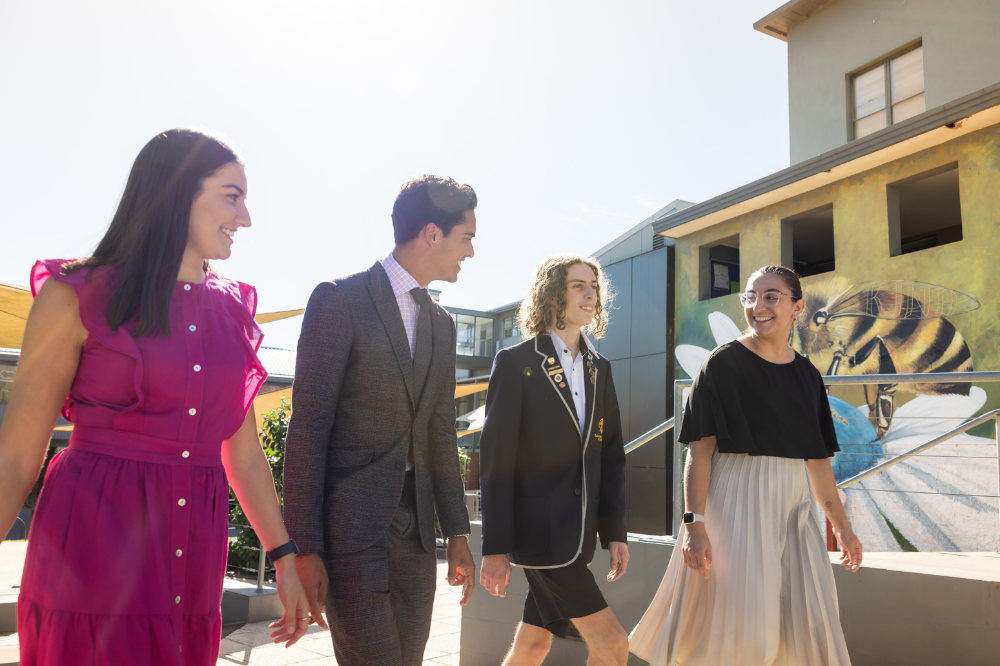
This article is sponsored by Salesian College Sunbury
A group of visiting teachers had an interesting but surprising recent visit to one of Salesian College Sunbury’s classrooms.
“Three quarters of the students were Year 10s. The other quarter was Year 9s, and there was one student that was actually Year 8, but none of us could tell who was who,” says acting principal Daniel Buttacavoli.
It’s the result of the progressive and personalised model My Salesian Passport (MSP), which has just completed its first year in operation and is the culmination of six years of research and brainstorming.
Students choose what speaks to them, allowing teachers to fine-tune things.
Buttacavoli says, “We wanted our students to love their schooling, to come out of it wanting to do more, rather than feeling like it was something that they had survived. The engagement is improved by tapping into student interests and also their readiness to learn.”
The beauty is that instead of a classroom of students all being taught the same things because they share the same year of birth, they’re able to embrace what motivates them.
“You’re more important than just that number assigned to you at birth; you’re much more of a whole person with very special and unique characteristics, interests and passions,” says Buttacavoli. “We want to build a system around the student, rather than feeding the student to the system.”
The school has invested resources in educating students and parents about how best to use its MSP.
From Years 7 to 9, students meet daily with their oratory teacher for 30 minutes, enabling a relationship to be built with the child and parents, so the teacher can be the first point of contact for advice.
The school also ensures that students are having conversations about their MSP all year long, not just the three-week period in July when choices are finalised.
“There’s lots of check-in throughout for the parent and student community to be able to have a good idea of what their passport or their learning map might look like,” says Ammie Franklin, deputy principal, people and culture. “There’s also a lot of education through our Professional Learning Series for our staff about how to give that advice.”
Room to grow
MSP’s vertical nature means that a student could be one or two years higher in a subject than they would be under the traditional learning model. This past year, 35% of students in Years 8 and 9 took on at least one subject higher than their age-related standards.
Students can drop down a year if they are being overstretched or have concerns, and this personalised nature of the system has brought everyone together.
“It did feel like a big change, so we had to make sure that we supported each other and acknowledged that this was part of the change process,” says Buttacavoli. “When we re-taught a lot of the subjects in semester two, we had a chance to refine and improve along the way. We had a robust meeting structure where instead of just telling people what they should do, we empowered them to collaborate in our curriculum teams to find out where the problems are.”
Salesian College also has a team of pedagogy coaches who meet with each teacher fortnightly, along with partnering with New Tech Network Australia, who specialise in project-based learning and have helped embed deeper learning principles with MSP.
To further aid this process, teachers are given five days of professional learning to build their projects plus student early finishing once a fortnight, which allows teachers a two-hour block to collaborate and refine the projects.
Franklin says, “That’s something they have been really appreciative and grateful for.”
While modern in its approach, MSP is rooted in fundamental values and enables students to go further, on whatever path they choose.
“One of the things that we try to do is prepare our students to be what we say is good Christians and honest citizens,” says Franklin. “It’s very much about continuing for us to reflect on what pathways our students are going to be going into. The future of education is uncertain at times; it’s our responsibility to continue to refine the units of learning that we offer, to continue to seek the voice of our students, our staff and our partners outside of secondary schools like universities.”
The validation that MSP is evident from the atmosphere inside the school. It’s created an environment where everyone is following something that speaks to them and sets off a chain reaction.
“When students get to pick things that they are passionate about, by extension, that means they get to be with students that are also passionate about those interests, and that creates really strong relationships and really enthusiastic classrooms,” says Buttacavoli.
The other stamp of approval for MSP is that regardless of academic ability or career ambition, it is flexible enough to include everyone.
“That is something that we want to really assure our parents that there’s always a place and always a pathway for every student in our school,” adds Buttacavoli.


